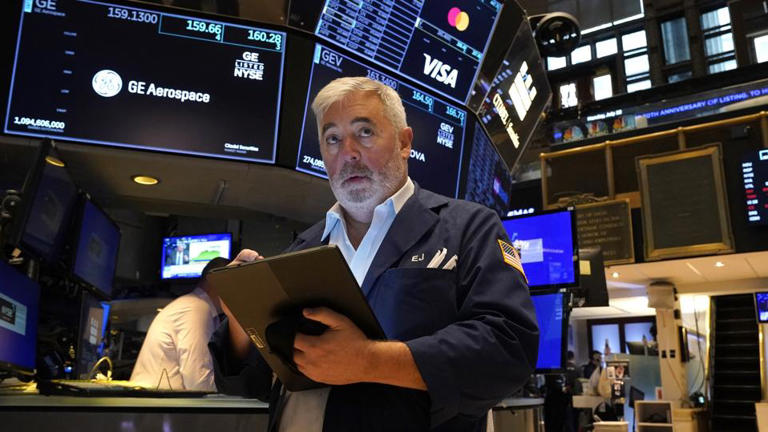On Wednesday, major stock indexes experienced substantial declines, reflecting investor concerns about the sustainability of current stock market valuations amid disappointing earnings reports from several prominent companies. The tech-heavy Nasdaq Composite dropped by 1.8%, the S&P 500 fell 1.1%, and the Dow Jones Industrial Average saw a smaller decline of 0.3% shortly after the market opened. These declines follow a wave of lackluster earnings reports from key players in the technology and financial sectors, which have raised questions about whether the market’s elevated valuations are justified by underlying economic fundamentals.
The day’s losses were heavily influenced by earnings reports from three of the U.S.’s most valuable companies: Alphabet (the parent company of Google), Tesla, and Visa. Each of these companies reported results that missed market expectations, leading to some of their worst single-day performances on Wall Street in recent months.
Tesla, in particular, saw its stock tumble by 11% after reporting a dramatic 45% year-over-year decline in profits. This was Tesla’s largest one-day drop since January and reflects investor disappointment with the company’s financial performance. Visa’s stock fell 4% after the company posted its first quarterly revenue miss since 2020. This drop is notable as it represents Visa’s steepest daily decline since May 2022. Alphabet’s shares also declined by 4%, despite the company beating earnings estimates. The drop was largely attributed to concerns over Alphabet’s substantial investments in artificial intelligence (AI) and cloud infrastructure, which have raised questions about future profitability and cost management.
The underwhelming performance of Alphabet and Tesla—both of which are part of the so-called “magnificent seven”—sets a troubling precedent for the sector. The magnificent seven, which also includes Amazon, Apple, Meta Platforms, Microsoft, and Nvidia, have been instrumental in driving significant earnings growth and inflating market valuations. The poor results from Alphabet and Tesla, the first two of the seven to report their second-quarter earnings, have introduced a negative tone into the market and raised concerns about the future performance of these high-profile companies.
Deutsche Bank strategist Jim Reid commented on the situation, noting that the underwhelming start to the earnings season for these influential companies could signal broader issues for the market. On Wednesday, shares of the remaining five companies in the magnificent seven also experienced declines: Amazon was down 1%, Apple fell 2%, Meta Platforms dropped 3%, Microsoft decreased by 1%, and Nvidia saw a 4% decline. This widespread decline among major tech stocks indicates a growing sense of unease among investors.
The combined market value loss for the magnificent seven on Wednesday amounted to approximately $460 billion, with Alphabet and Tesla each contributing roughly $85 billion to this substantial reduction in market capitalization. This significant drop underscores the volatility and sensitivity of the market to earnings reports from major tech firms, particularly those with large valuations and high investor expectations.
Looking ahead, the market will be closely watching the upcoming earnings reports from Microsoft, Meta Platforms, Amazon, and Apple, which are scheduled for release next week. Nvidia is set to disclose its earnings in late August. The performance of these companies will be crucial in determining whether the recent market declines are indicative of broader issues or merely a temporary setback.
Additionally, the U.S. is expected to release its second-quarter gross domestic product (GDP) report soon, which will offer further insights into the overall economic performance. This report could play a significant role in shaping market expectations and influencing stock prices. Sevens Report analyst Tom Essaye highlighted that the future trajectory of the S&P 500 will be closely tied to broader economic growth trends, emphasizing the importance of economic data in determining market direction.
Goldman Sachs strategists have also warned of a potential summer selloff, pointing to the possibility of increased market volatility due to recent gains and geopolitical uncertainties. As investors navigate these challenges, the focus will remain on upcoming earnings reports and economic indicators, which will be critical in assessing the health of the market and its ability to sustain current valuations.
